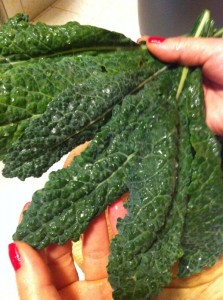 What are the benefits of Kale Juice? Kale juice is considered by nutritionists to be the best vegetable juice in the world with extremely powerful antioxidant, anti-inflammatory, and anti-cancer properties. Kale juice is great for boosting your immune system. Kale juice is high in beta carotene, vitamin C, vitamin K, lutein, zeaxanthin, and calcium. Kale juice contains sulfur-containing phytonutrients called sulforaphanes which have potent anti-cancer properties. The sulforaphanes are formed when kale is chopped, juiced, chewed or blended and triggers the liver to produce enzymes that aid in detoxifying cancer-causing chemicals. These are called glucosinolates and they give our body the upper hand in dealing with exposure from the toxins we get from foods and/or the environment.
What are the benefits of Kale Juice? Kale juice is considered by nutritionists to be the best vegetable juice in the world with extremely powerful antioxidant, anti-inflammatory, and anti-cancer properties. Kale juice is great for boosting your immune system. Kale juice is high in beta carotene, vitamin C, vitamin K, lutein, zeaxanthin, and calcium. Kale juice contains sulfur-containing phytonutrients called sulforaphanes which have potent anti-cancer properties. The sulforaphanes are formed when kale is chopped, juiced, chewed or blended and triggers the liver to produce enzymes that aid in detoxifying cancer-causing chemicals. These are called glucosinolates and they give our body the upper hand in dealing with exposure from the toxins we get from foods and/or the environment.
Most people think dairy products are the best choice for calcium. But the truth is that dark leafy vegetables like kale are the best!
Kale juice also contains oxalates, naturally occurring substances found in plants, animals, and human beings. When oxalates are accumulated in the body, they can form crystals and may cause health problems. People with gallbladder or kidney problems may want to avoid eating kale or drinking kale juice, spinach and other vegetables containing oxalates. Many people rotate the greens that they use in their green juice to avoid these problems.
Kale juice is high in Vitamin K and therefore should be avoided by anyone taking anti-coagulant medications such as warfarin. The combination of the two may decrease the effectiveness of warfarin, which could be very unsafe to you if you were to develop a blood clot. Other vegetables that contain vitamin K are collard and mustard greens, spinach, broccoli, dandelion, brussels sprouts, parsley and swiss chard.
Kale and kale juice are sometimes referred to as “goitrogenic” foods. Contrary to popular belief and according to the latest studies, foods themselves are not “goitrogenic” in the sense that they cause goiters when they are consumed or even when they are eaten in excess. In fact, the foods that are commonly called “goitrogenic” such as the cruciferous vegetables including broccoli, cauliflower and soy foods, do not interfere with thyroid function in healthy persons even when they are consumed daily. But under certain circumstances, they may interfere with thyroid function. The term “goitrogenic food” makes it sound as if something is wrong with the food, but that is simply not the case. What causes problems for certain individuals is not the food itself but the mismatched nature of particular substances within their food to their specific health circumstances.
Kale is among the 12 foods on which high amounts of residues from pesticides have been found. Therefore it is recommended that organic kale is used. We spend a lot of time perfecting recipes, and our special super kale juice recipe is just that! Give it a try.
Kale juice tastes good with carrots, celery, cucumber, lemons, apples, grapes and ginger.
